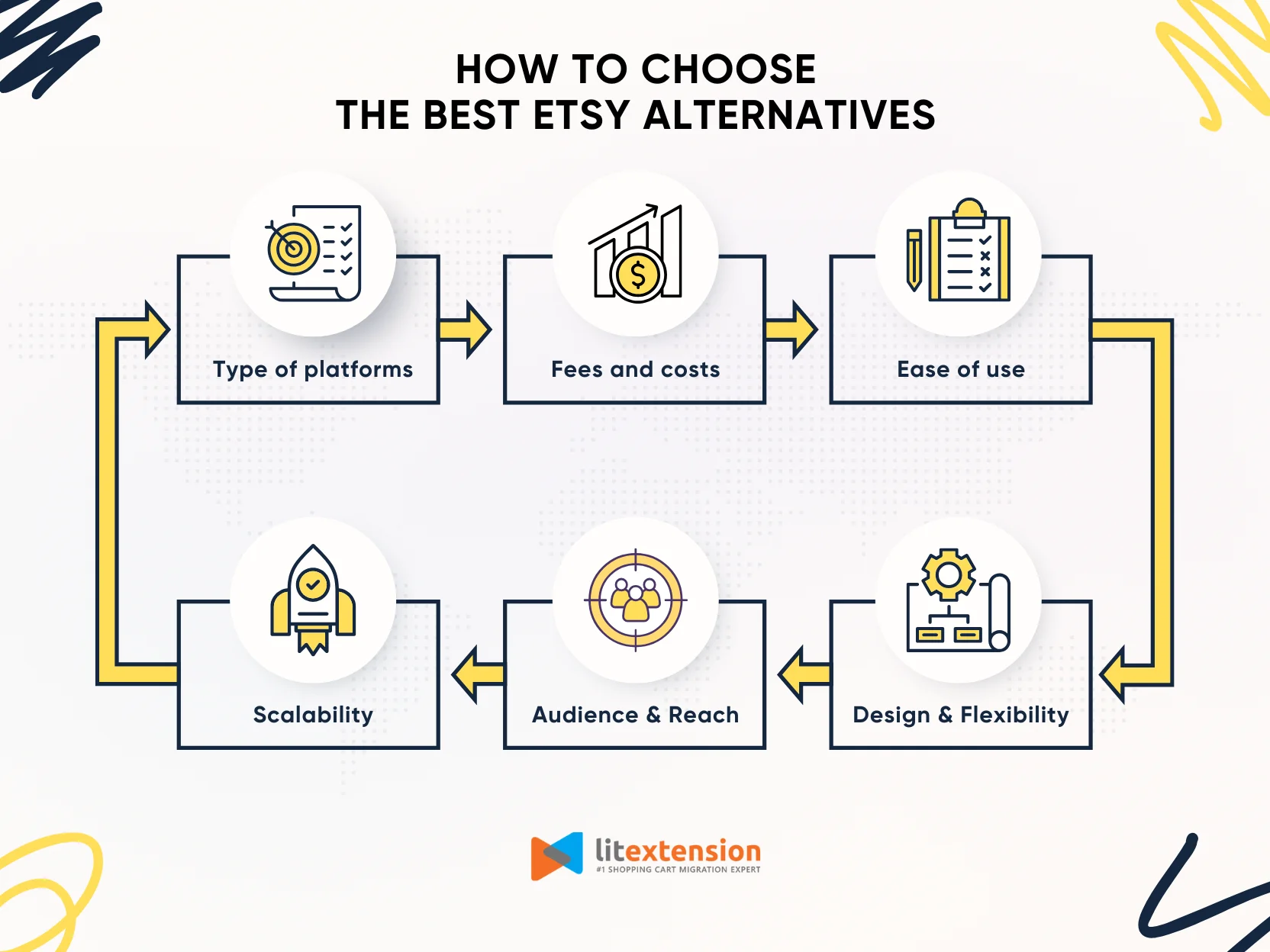Etsy has been a popular platform for selling handmade and creative products for many years. However, with several changes that happened recently, many small business owners and crafters are now looking for Etsy alternatives to grow their businesses.
The good news is that there are many other platforms that can help sellers reach their goals. In this article, let's break down the 10 best Etsy alternatives for your consideration.
Platform | Best for | Why it's a better choice than Etsy |
Professional makers seeking high-volume sales and global reach | - Leverages Amazon’s massive customer base and global shipping network - Trusted brand that inspires buyer confidence - Fewer product restrictions and better visibility for premium goods | |
Sellers of customizable products looking for flexible selling formats | - More flexible product categories (not limited to handmade or vintage) | |
Independent brands aiming to build a long-term, scalable online store | - Total control over store design, branding, and pricing | |
High-growth businesses that need robust ecommerce tools and integrations | - Built-in advanced features like multi-channel selling and SEO tools | |
Creatives who want to showcase and sell visually stunning products without technical hassle | - User-friendly drag-and-drop website builder | |
Part-time artists or crafters launching their first online shop with minimal investment | - Offers a free plan for up to 5 products with no listing fees | |
Designers and visual creators who want a portfolio-driven shopping experience | - Award-winning designs perfect for portfolios and product galleries | |
Experienced sellers comfortable with WordPress and looking for maximum flexibility and control | - Fully customizable with thousands of plugins and themes | |
Graphic designers and illustrators interested in passive income through print-on-demand | - No need to manage inventory, printing, or shipping | |
Multi-platform sellers who want to expand their reach with minimal extra effort | - Easy product import from Etsy, eBay, and Amazon |
Whether you're new to selling or ready to switch, this guide will help you take the next step. So without further delays, let's get started!
#1 Amazon Handmade
➤ Best for: Experienced artisans and small businesses ready to scale with global reach. Ideal for sellers who want high visibility and are comfortable with structured platforms.
Coming first in our list of the best Etsy alternatives today is Amazon Handmade. It is Amazon’s artisan marketplace created specifically for sellers of handcrafted products. It allows makers to reach Amazon’s massive global audience while showcasing authentic, handmade goods. Unlike regular Amazon sellers, Handmade artisans must apply and be approved, ensuring the platform stays focused on true craftsmanship.
By selling through Amazon Handmade, you gain access to trusted tools like Amazon Prime, global fulfillment options, and one of the most visited ecommerce platforms in the world.
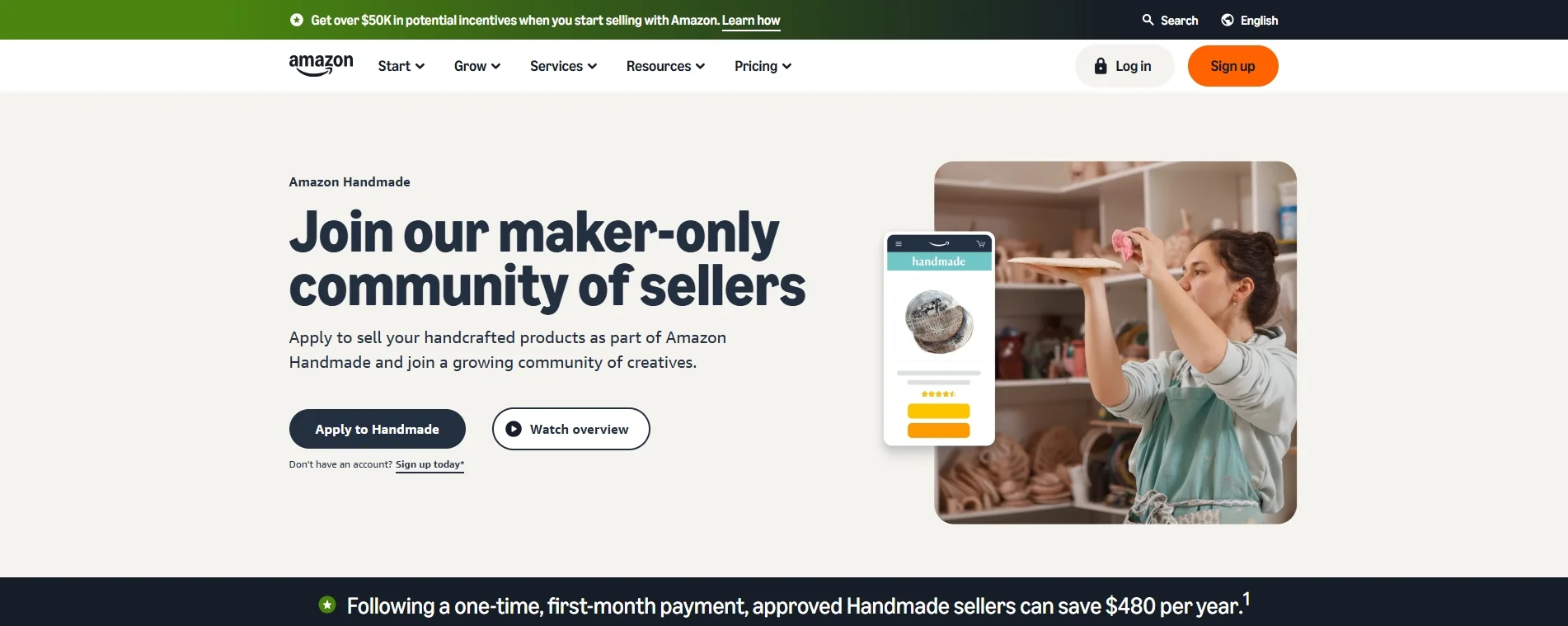
The pros and cons of Amazon Handmade:
Pros | Cons |
✓ Huge customer base and trusted brand ✓ Global reach across Amazon’s international marketplaces ✓ Access to Amazon Prime shipping and fulfillment tools ✓ No listing fees for handmade products | ✗ Requires an application and approval process ✗ Limited customization for your storefront ✗ Less emphasis on building a personal brand or community ✗ Setup and navigation may feel complex for new sellers |
Why Amazon Handmade is among the best Etsy alternatives:
- Massive built-in traffic: Amazon draws millions more monthly visitors than Etsy, which can result in more visibility for your products.
- Strong buyer trust: Customers often feel more secure purchasing from Amazon due to its fast shipping, return policies, and customer service.
- No listing fees: Unlike Etsy’s per-item listing fee, Amazon Handmade allows unlimited product listings without extra cost.
- Curated marketplace: Every artisan is reviewed before joining, which helps maintain quality and reduce competition from mass-produced items.
Amazon Handmade pricing:
- Individual: $0.99/item sold
- Professional: $39.99/month
In short, if you’re looking to take your handmade business to a more scalable, global level, Amazon Handmade is one of the top Etsy alternatives to consider. In case you want a full picture of how this platform stacks up against Etsy, please check out our in-depth comparison on Amazon Handmade vs Etsy here.
#2 eBay
➤ Best for: Sellers of handmade, vintage, or custom items who want flexible pricing and a broad, global customer base.
eBay may not be the first platform that comes to mind for handmade goods, but it’s a powerful and flexible marketplace with a global audience. Originally known for auctions and secondhand items, eBay now supports a wide range of product categories, including handmade, vintage, and custom items.
Unlike Etsy, eBay doesn’t limit sellers to handmade-only products, giving creators more room to experiment with different product types and pricing models. Its massive reach, strong search engine presence, and buyer trust make it a compelling alternative.
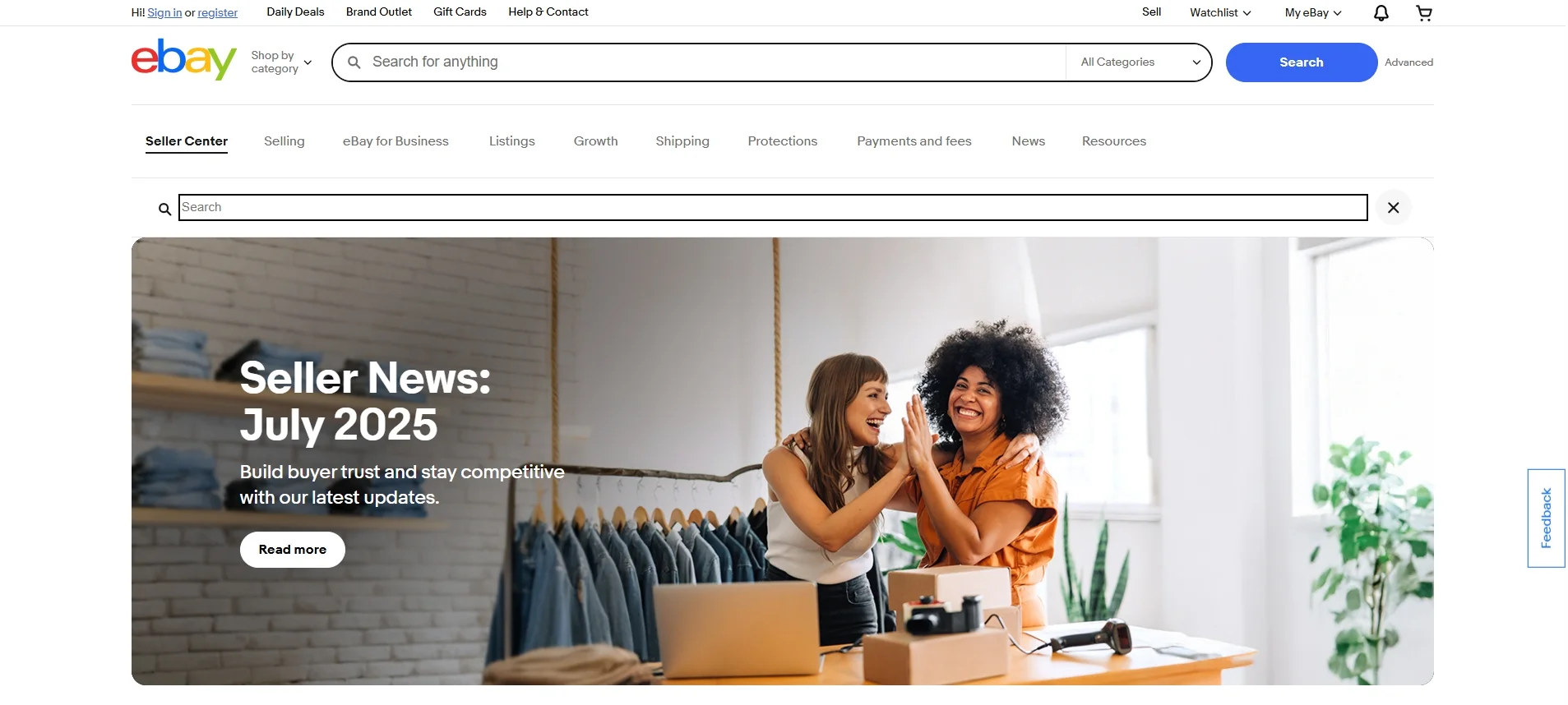
The pros and cons of eBay:
Pros | Cons |
✓ Huge global marketplace with millions of active buyers ✓ Flexible pricing formats: fixed-price, auction, or best offer ✓ Ability to list a wide variety of product types ✓ Strong search visibility through Google and eBay's engines | ✗ Not dedicated exclusively to handmade or artisan goods ✗ High competition from non-handmade and mass-produced items ✗ Less community feel or personal storefront customization ✗ Fees can add up, including final value fees and optional upgrades |
Why eBay is among the best Etsy alternatives:
- More product freedom: eBay doesn’t restrict what you can sell as tightly as Etsy does. You can list handmade, vintage, or even related resale items without worrying about policy violations.
- Flexible selling options: Use auctions, fixed pricing, or allow best offers, giving you more control over how and when your items sell.
- Global reach: eBay supports over 190 markets, giving handmade sellers access to a broader international customer base.
Pricing:
- Subscription fee: $4.95 to $2999.95 per month
- Insertion fee: eBay provides sellers with a certain amount of free listings that can go up to 250 (based on the seller account type). However, if you exceed the amount of free listings given, you will be paying $0.35 per listing. This charge will recur every 30 days as well.
- Final value fee: 6% to 15% of total sales value + $0.30 per order.
If you create one-of-a-kind, custom, or collectible handmade items, eBay is a powerful Etsy alternative that offers flexibility, reach, and a well-established buyer base. For better insights into how these platforms stack up, please check out our Etsy vs eBay comparison.
#3 Shopify
➤ Best for: Handmade sellers who want full creative and business control, and are ready to build a long-term, independent brand.
Shopify is one of the best Etsy alternatives in the world, and for good reason. Unlike marketplaces like Etsy or Amazon Handmade, Shopify lets you build your own online store with full control over branding, design, and customer experience. It’s ideal for handmade sellers who are ready to treat their shop like a real business and want to grow beyond the limitations of third-party marketplaces.
With Shopify, you get access to a powerful suite of Shopify features, including payment processing, inventory management, mobile optimization, and thousands of third-party apps to enhance your store.
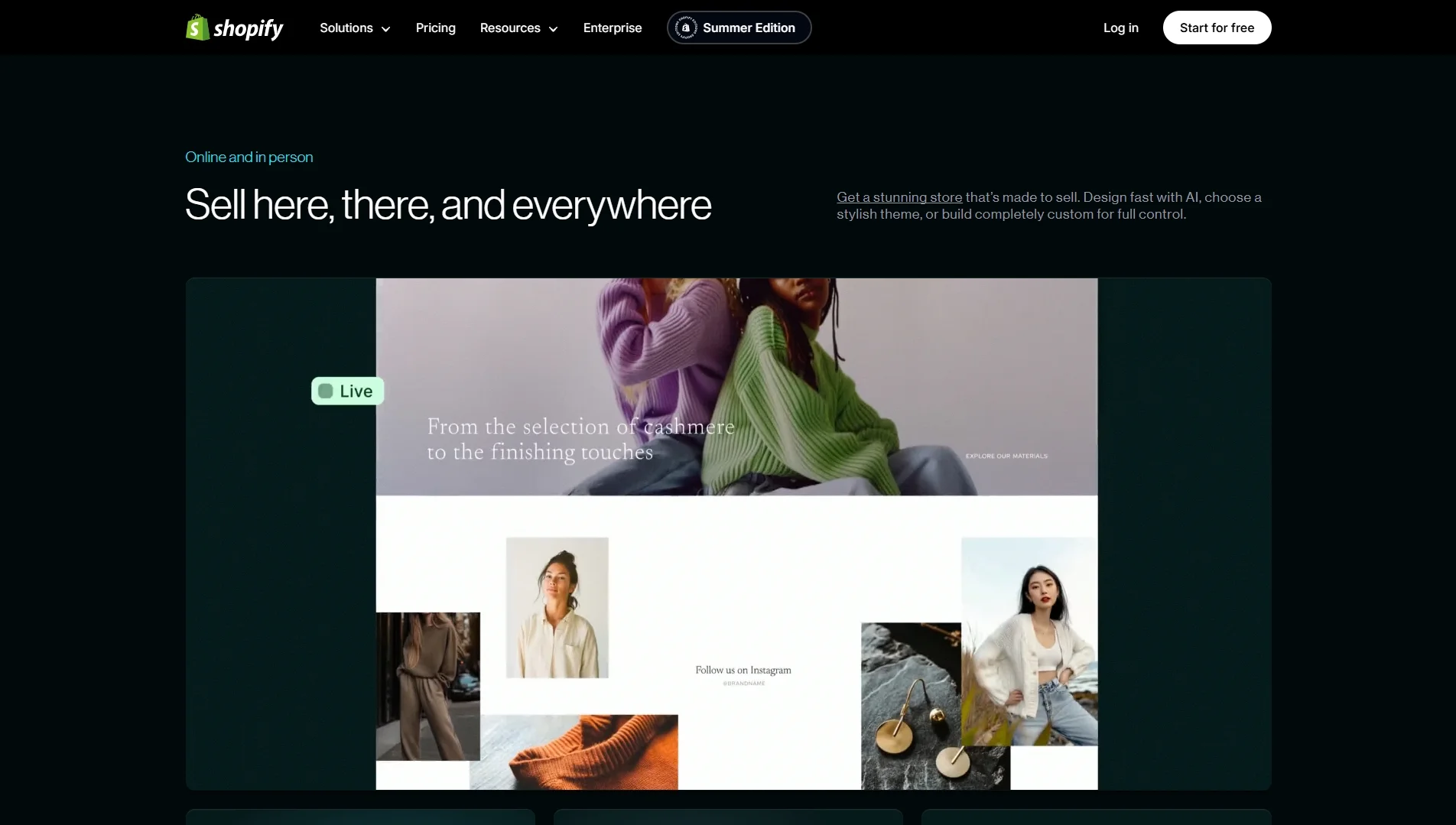
The pros and cons of Shopify:
Pros | |
✓ Full control over your brand, store layout, and customer experience ✓ No listing fees or marketplace competition ✓ Huge app marketplace for advanced features and integrations ✓ Supports multi-channel selling, including Etsy and social media | ✗ Requires effort to bring your own traffic (no built-in audience) ✗ Learning curve for new users, especially with customization ✗ May need extra tools or add-ons to further enhance your store's functions ✗ Theme and plugin fee might add up to your monthly cost |
Why Shopify is among the best Etsy alternatives:
- Total brand ownership: With Shopify, your store reflects your identity. You get a custom domain, a unique design, and no competing seller ads.
- No listing fees: Unlike Etsy, Shopify doesn’t charge per item listed, helping sellers save over time.
- Scalability: Whether you’re just starting out or ready to scale, Shopify offers powerful tools for marketing, inventory, shipping, and analytics.
- App integrations: From upsells and email marketing to reviews and abandoned cart recovery, Shopify's app store lets you tailor your store to fit your needs.
Shopify pricing: From $29 to $2,300+ per month (if pay annually)
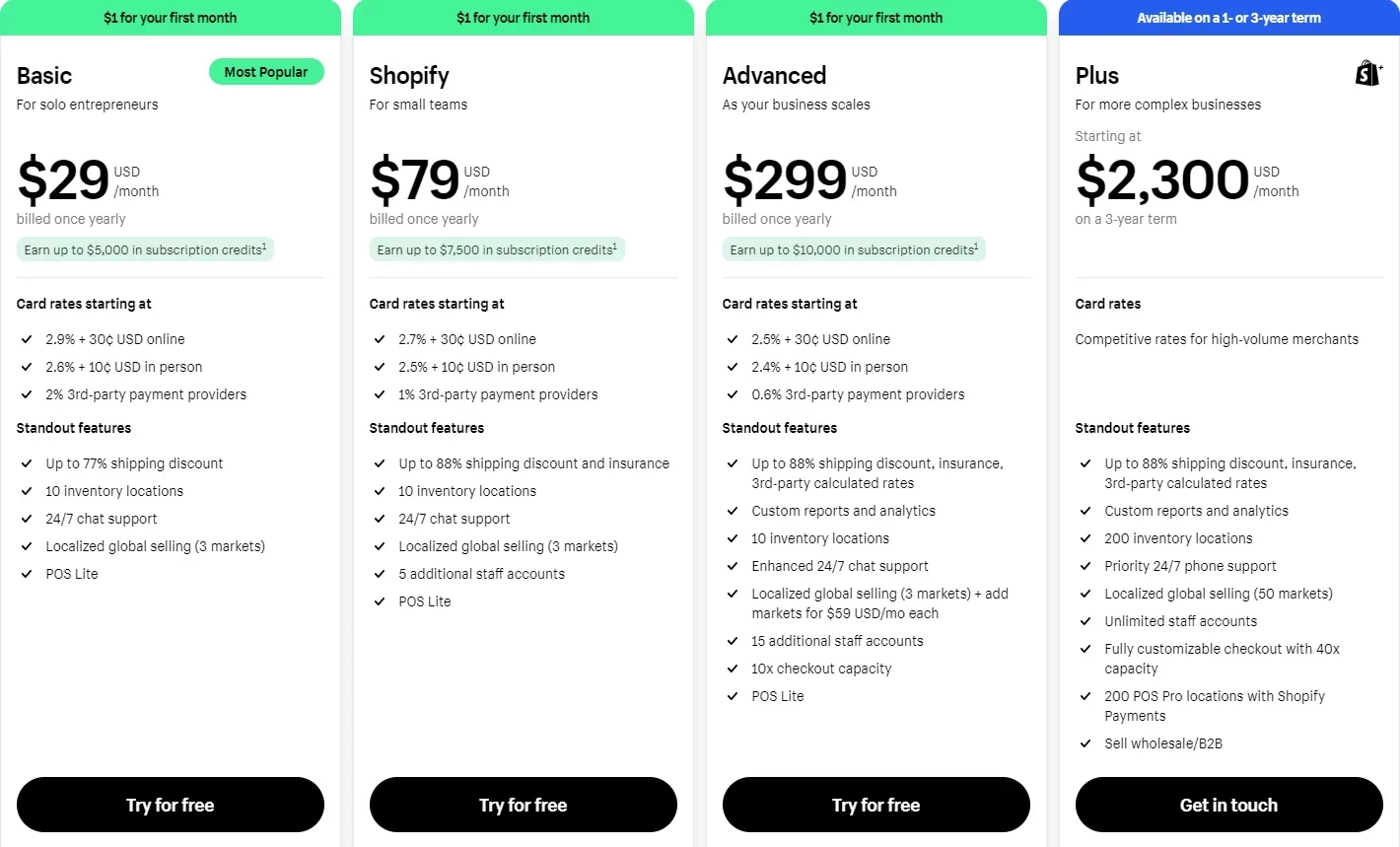
If you’re serious about turning your handmade shop into a standalone brand, Shopify is one of the best Etsy alternatives for sustainable, long-term growth. Please check out our full comparison of Shopify vs Etsy here to get more expert tips and insights on this platform.
#4 BigCommerce
➤ Best for: Established handmade businesses or fast-growing sellers that need a scalable, feature-rich platform with room for advanced growth.
BigCommerce is a robust, enterprise-level ecommerce platform designed for businesses that are ready to scale. Similar to Shopify, it lets you create a fully branded online store, but with even more built-in features, especially for sellers with larger inventories or advanced ecommerce needs.
Unlike Etsy or other marketplaces, BigCommerce offers deep customization, native SEO tools, and strong performance for high-volume sellers. It’s an excellent Etsy alternative if you're looking for a solution that grows with you without relying on third-party apps for essential features.
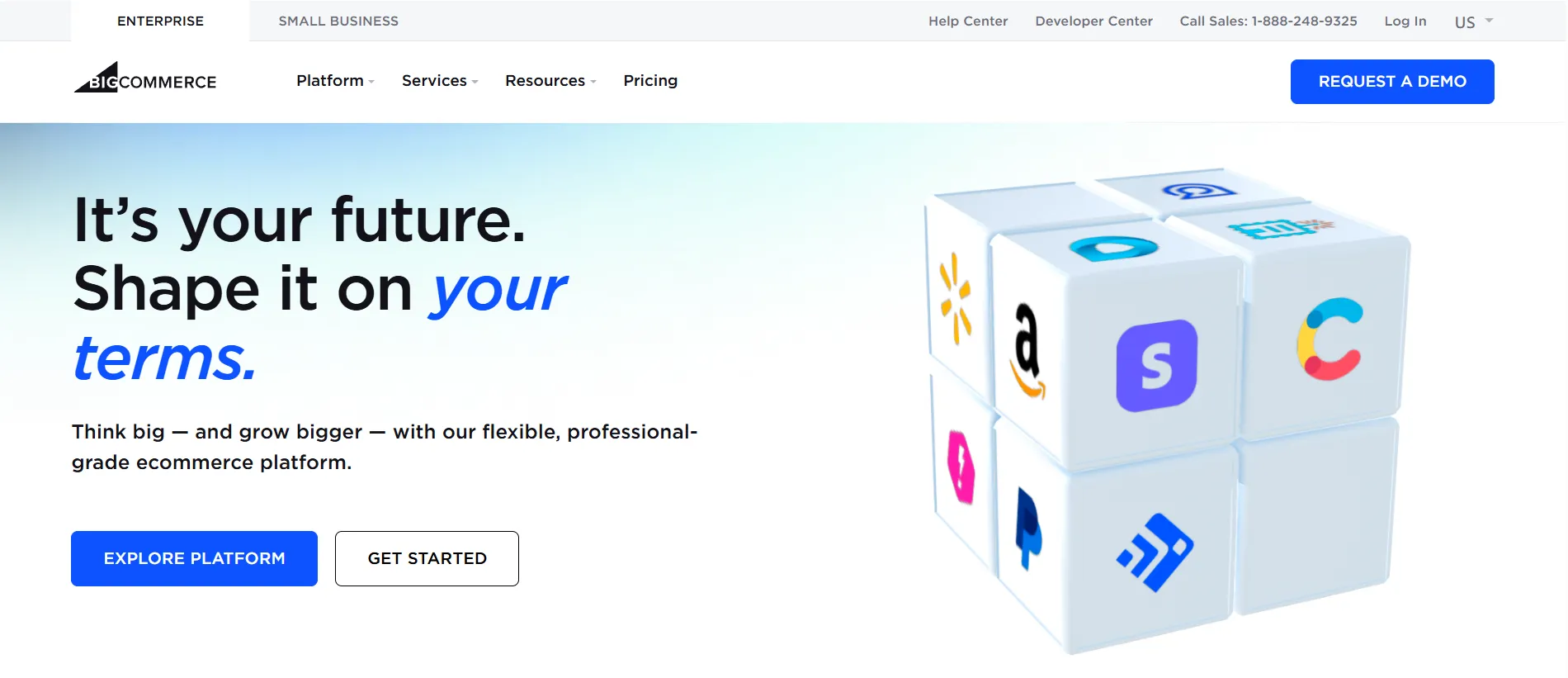
The pros and cons of BigCommerce:
Pros | Cons |
✓ No transaction fees on any plan ✓ Built-in tools for SEO, marketing, product filtering, and multi-channel selling ✓ Strong analytics and performance tracking out of the box ✓ Scalable for large catalogs and growing businesses | ✗ Steeper learning curve for complete beginners who've started out ✗ Limited selection of free themes ✗ Some advanced features may require developer support ✗ Not ideal for casual or hobbyist sellers |
Why BigCommerce is among the best Etsy alternatives:
- No commission fees: BigCommerce doesn’t take a cut of your sales, unlike Etsy’s transaction and listing fees, meaning better margins as you grow.
- Built-in advanced features: Most tools you’d need (SEO, filtering, coupon systems, multi-channel integrations) are built-in, saving money on third-party apps.
- Supports large product catalogs: Unlike Etsy, BigCommerce is built to manage complex inventories with ease.
- Better for B2B or wholesale options: If you want to expand into bulk or wholesale selling, BigCommerce offers native features that Etsy lacks.
BigCommerce pricing: From $39 to $399 per month. Custom pricing is offered for enterprise-level businesses.
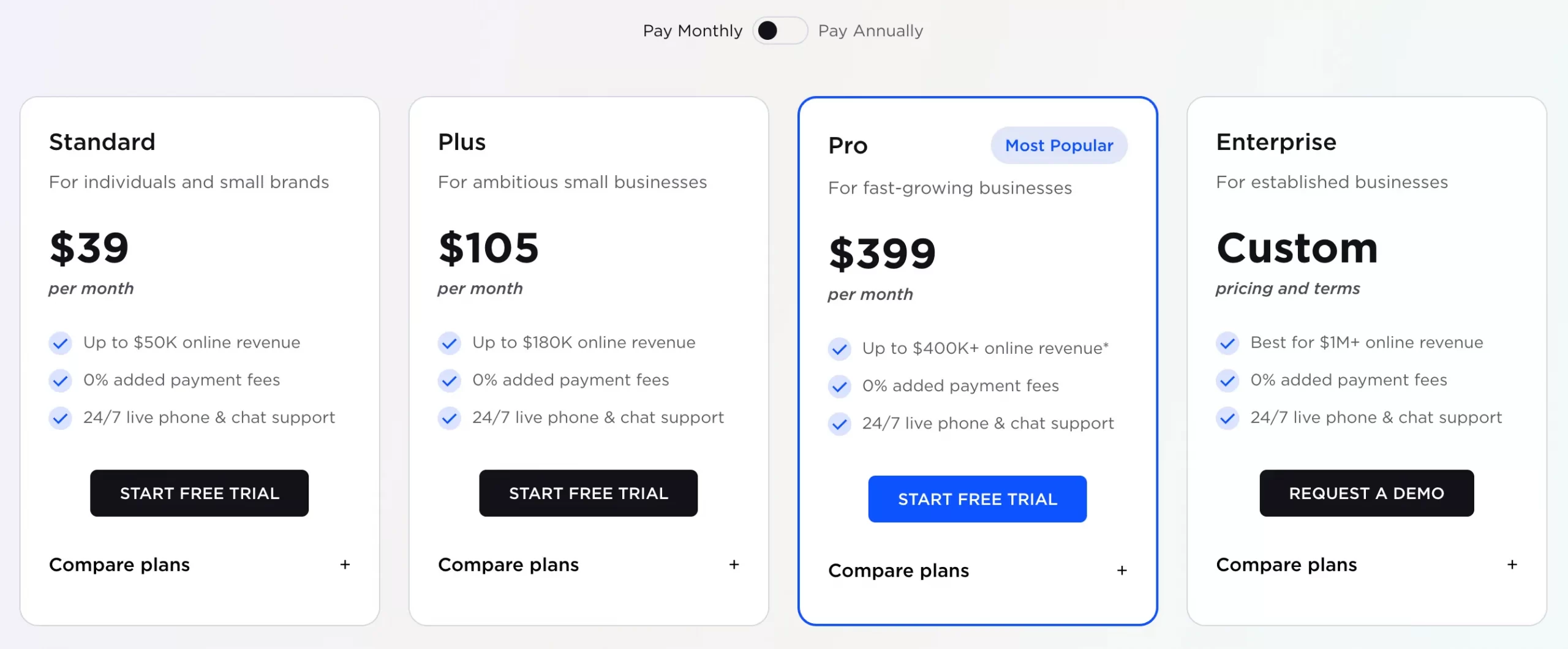
If your handmade business is growing fast and you’re ready for an advanced ecommerce solution, BigCommerce is among the most powerful Etsy alternatives built for serious sellers.
#5 Wix
➤ Best for: Creative sellers, makers, and artists who want a visually stunning online store that’s simple to build and manage without technical skills.
Wix is a popular website builder that combines beautiful design freedom with built-in ecommerce functionality. It’s especially attractive to artists, crafters, and handmade sellers who value visual presentation and want an easy, code-free way to set up a professional online store.
Unlike Etsy, where all shops follow a similar layout, Wix lets you fully customize your website and store design to match your brand style. With drag-and-drop editing, hundreds of modern templates, and built-in tools for blogging, SEO, and marketing, Wix offers a flexible, all-in-one platform for creative entrepreneurs.
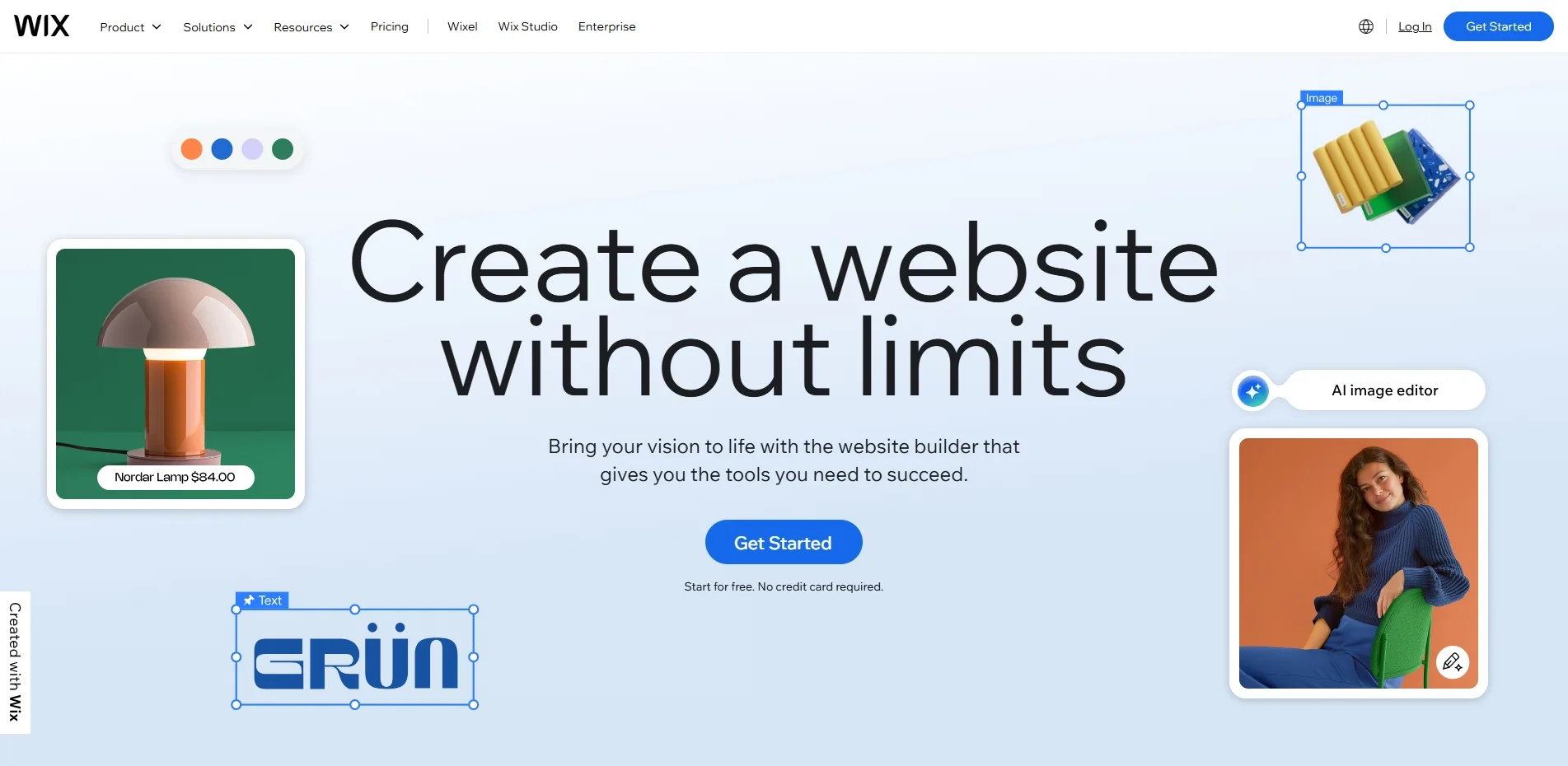
The pros and cons of Wix:
Pros | Cons |
✓ User-friendly drag-and-drop builder with no coding required ✓ Hundreds of customizable templates for creative and product-focused sites ✓ Lower learning curve, ideal for beginners and visual thinkers ✓ Great for combining blog, portfolio, and store in one place | ✗ Less scalable than Shopify or BigCommerce for large or complex stores ✗ Not ideal for high-volume or advanced ecommerce operations ✗ Limited access to third-party integrations compared to competitors |
Why Wix is among the best Etsy alternatives:
- Full design control: Unlike Etsy’s uniform shop layout, Wix gives you complete freedom to design your website exactly how you want it—from homepage to product pages.
- No marketplace competition: Your products won’t appear alongside other sellers, so you don’t compete for customer attention.
- Cost-friendly for small shops: With affordable plans and no listing fees, Wix is ideal for small-scale sellers who want full control without high costs.
- Better for Branding: Add custom fonts, animations, galleries, and video to create an immersive brand experience, something Etsy can’t support.
Wix pricing: From $17 to $159 per month
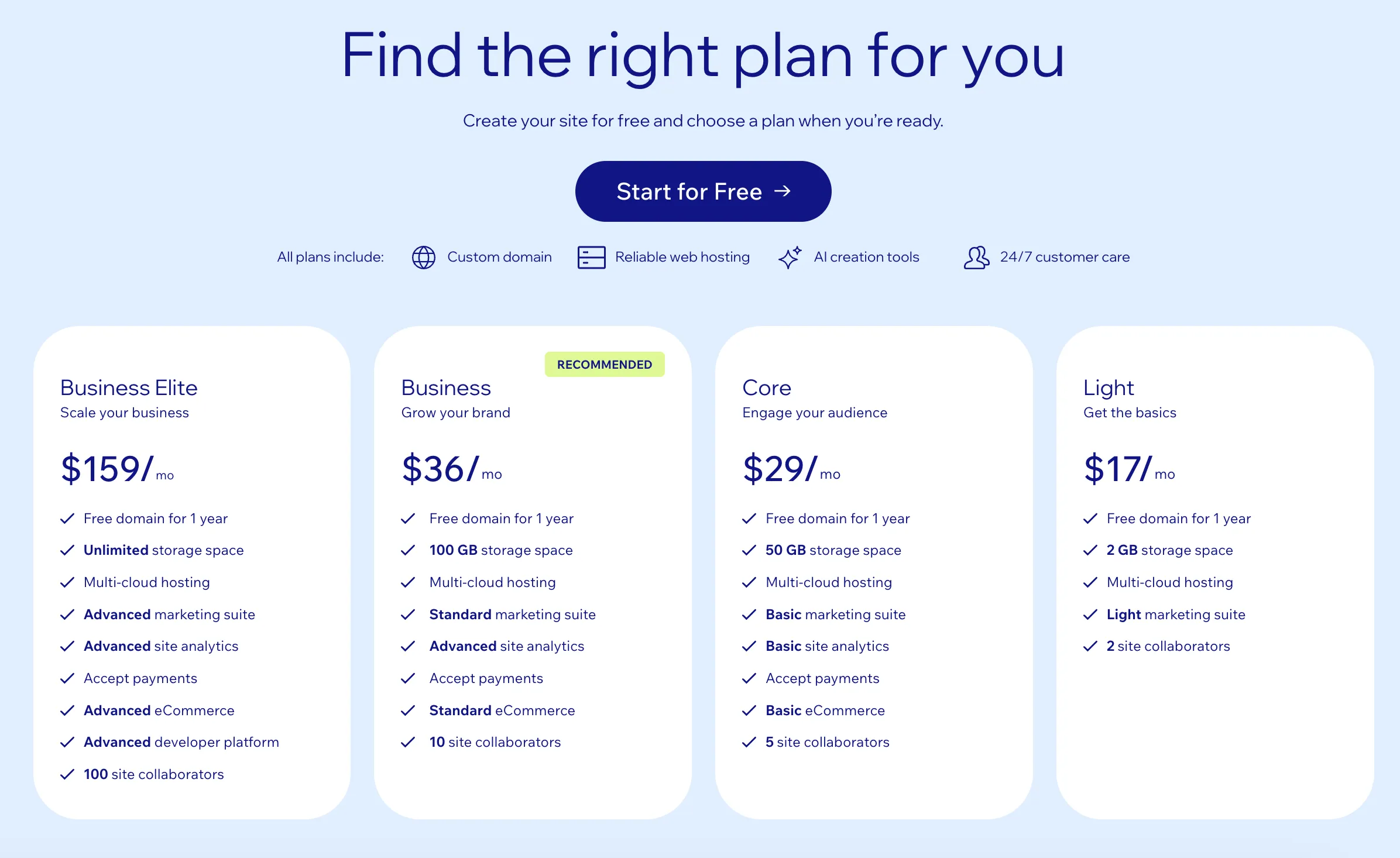
If you're a creative entrepreneur who wants to build a unique and professional online store without learning to code, Wix is among the top Etsy alternatives worth considering. For a full breakdown of these two platforms, please check out our comparison of Wix vs Etsy.
#6 Big Cartel
➤ Best for: Hobbyists, indie artists, and small-scale handmade sellers who want a quick, low-cost way to sell online without tech hassles.
Big Cartel is a lightweight, beginner-friendly ecommerce platform designed specifically for artists, crafters, and makers. It offers a simple and affordable way to create an online store without the complexity of larger platforms like Shopify or BigCommerce. With a clean interface, minimal setup, and a free plan for small shops, Big Cartel is perfect for independent creators just starting out.
Unlike Etsy, Big Cartel gives you more control over your storefront without charging listing fees. It’s built for simplicity, making it easy to launch your handmade business quickly and affordably.
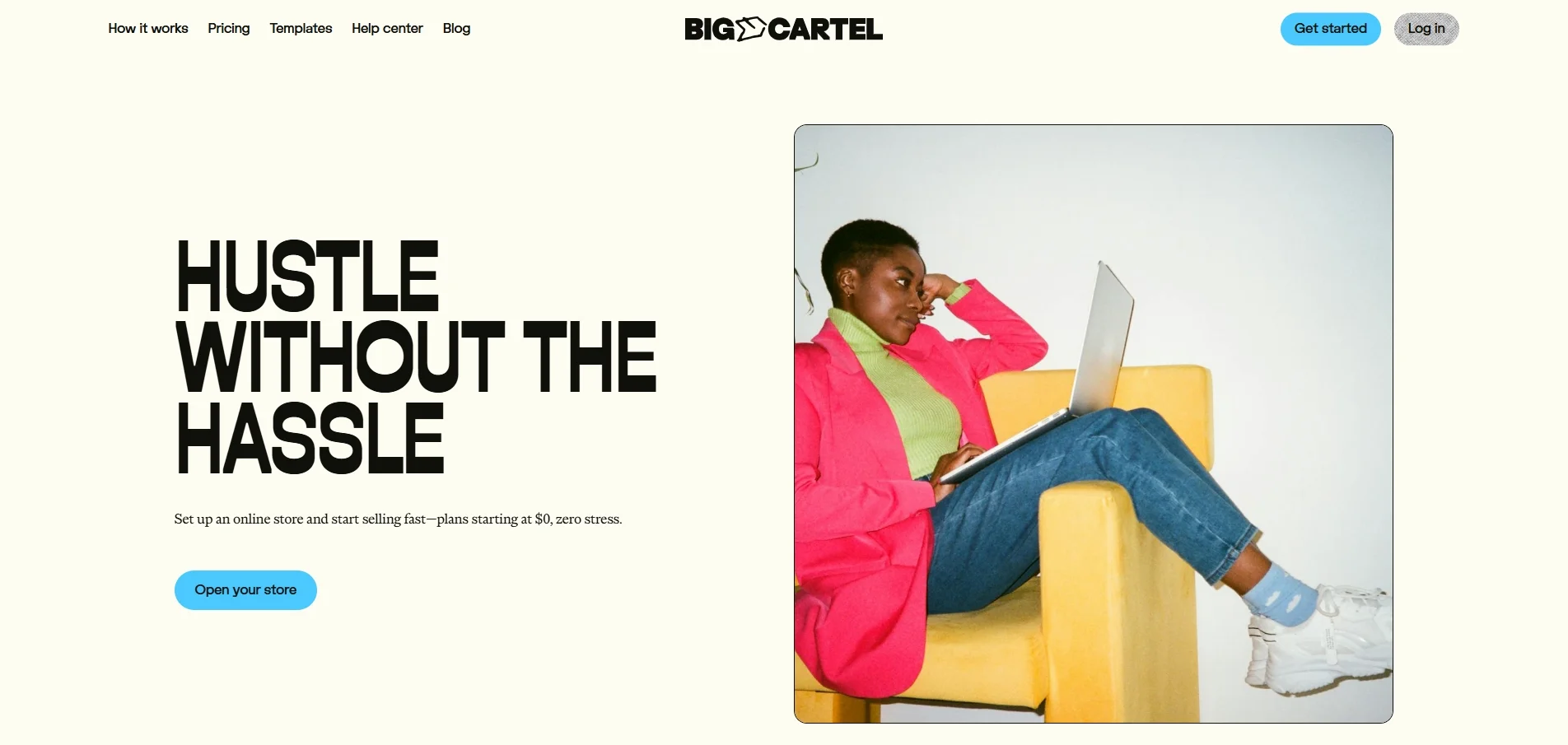
The pros and cons of Big Cartel:
Pros | Cons |
✓ Free plan available (up to 5 products) ✓ No listing fees or hidden charges ✓ Easy to use and quick to set up ✓ Clean, ad-free storefront with your own branding | ✗ Limited features compared to Shopify or Wix ✗ Basic design options and fewer customization tools ✗ Less robust analytics and marketing tools ✗ Not ideal for larger inventories |
Why Big Cartel is among the best Etsy alternatives:
- Zero listing fees: Unlike Etsy, Big Cartel doesn’t charge per product listing, which saves money, especially for small shops with tight margins.
- Free plan option: Great for testing the waters, you can launch a fully functional store without paying anything upfront.
- No marketplace competition: Your store is your own, without distractions from other sellers or competing products.
- Quick and easy launch: You can set up your store in minutes, perfect for those who want to start selling without a steep learning curve.
Big Cartel pricing: From $0 to $30 per month
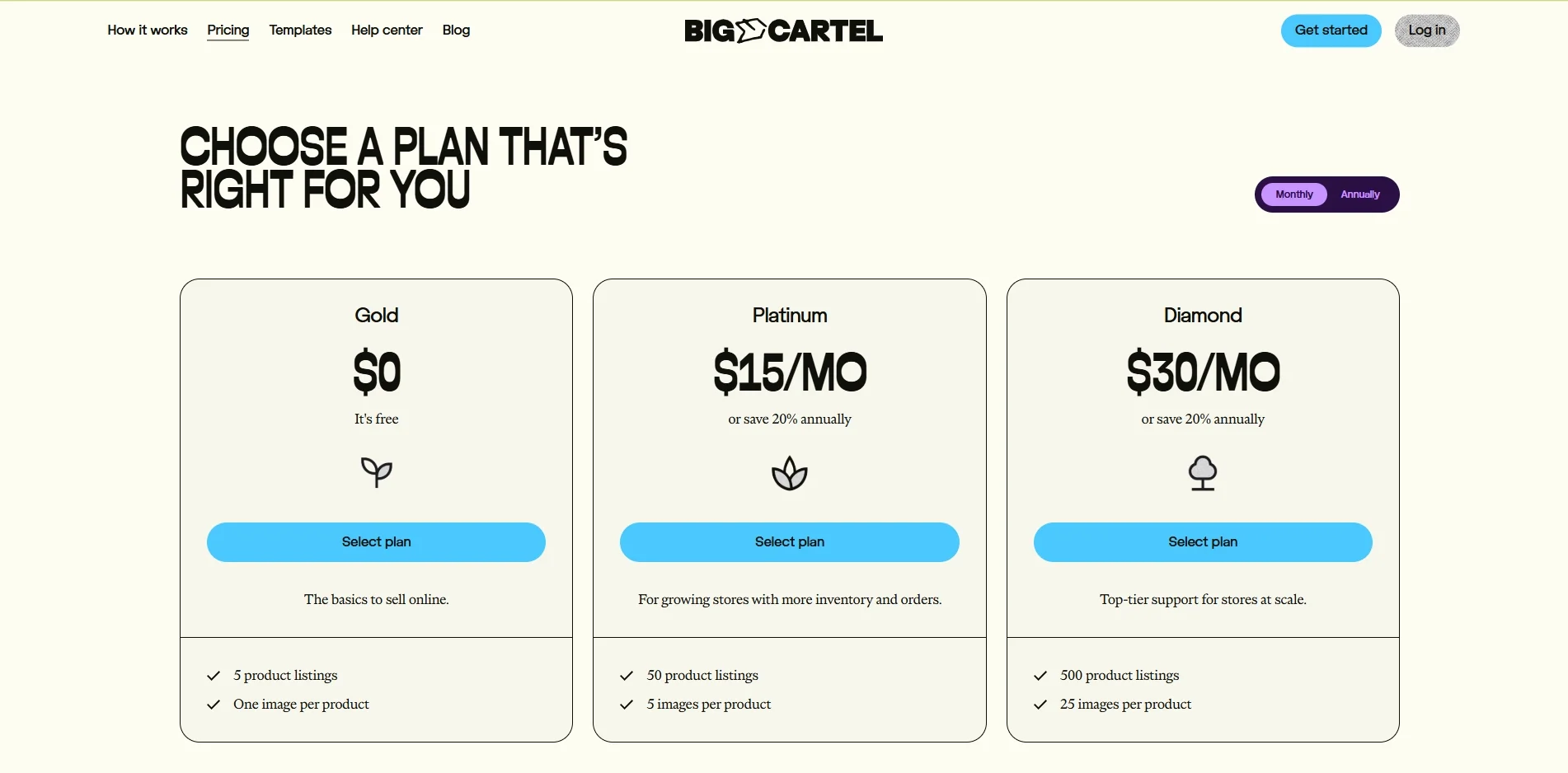
If you’re a solo creator or artist looking for an affordable and minimalist way to sell your handmade goods online, Big Cartel is among the most practical and user-friendly Etsy alternatives to consider. To get more expert tips and insights on these platforms, please don't forget to take a look at our Big Cartel vs Etsy.
#7 Squarespace
➤ Best for: Design-focused sellers, artists, and makers who want a stylish online store that combines content and commerce under one brand experience.
Squarespace is a premium website builder known for its elegant design templates and all-in-one platform. It allows handmade sellers to build visually stunning online stores that combine ecommerce, content, and branding in one cohesive experience. For creatives who value aesthetics and want their shop to double as a professional portfolio, Squarespace is a standout choice.
Unlike Etsy, Squarespace gives you full control over how your brand is presented. Whether you’re selling jewelry, art, ceramics, or custom goods, it offers powerful tools to showcase your work beautifully and professionally.
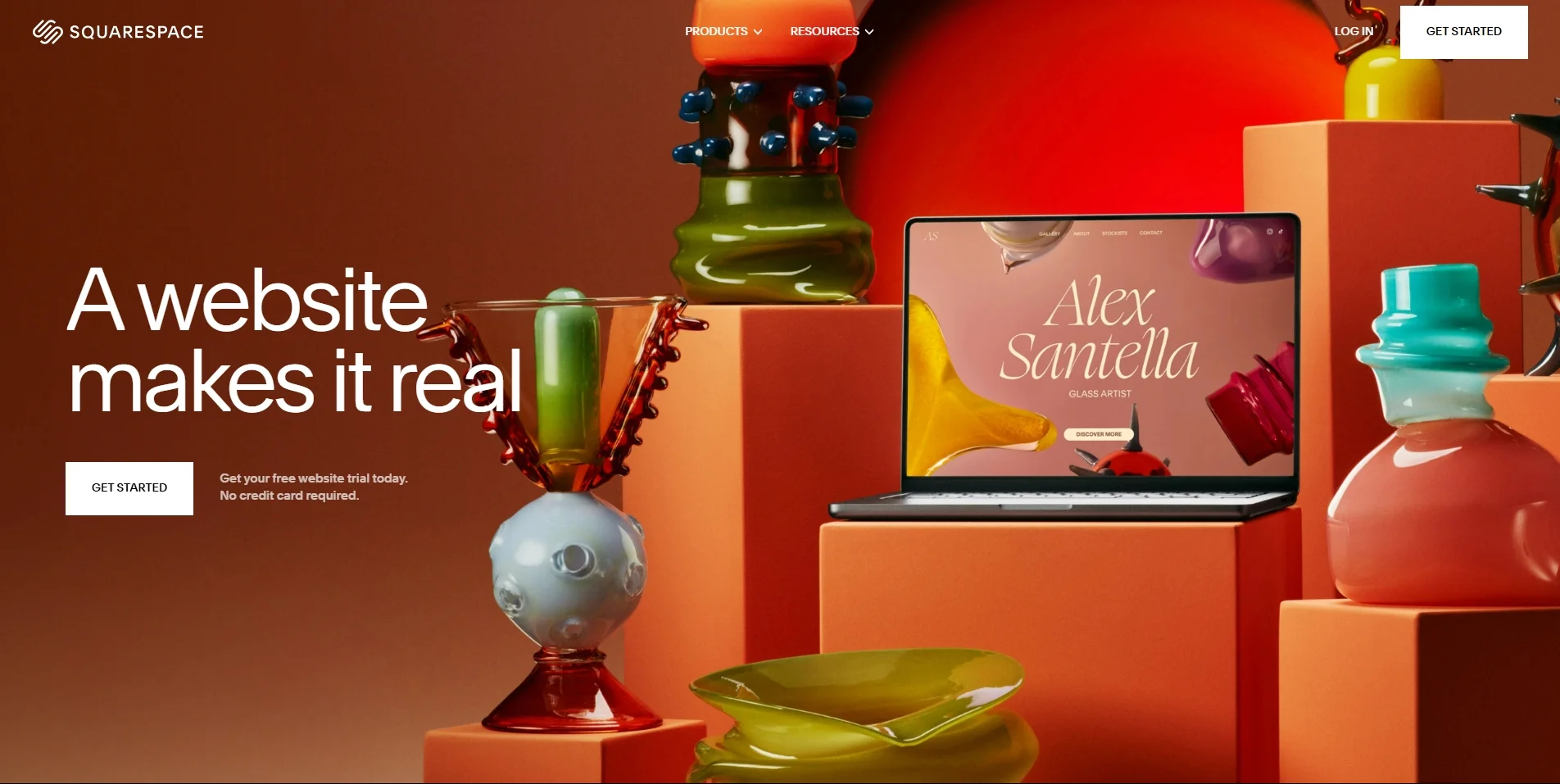
The pros and cons of Squarespace:
Pros | Cons |
✓ Award-winning templates perfect for visual storytelling ✓ Strong content creation tools for blogging and email marketing ✓ All-in-one platform (website, blog, store, analytics, marketing) ✓ Excellent for building a premium, design-forward brand | ✗ No free plan available ✗ Fewer eCommerce extensions than Shopify or WooCommerce ✗ Limited payment gateways compared to larger platforms ✗ Not ideal for high-volume stores or complex product setups |
Why Squarespace is among the best Etsy alternatives:
- High-end branding: Squarespace lets you create a polished, premium shopping experience that’s impossible to replicate on Etsy.
- No competing sellers: Unlike Etsy, you won’t be competing for attention on product pages or in search results.
- Integrated marketing tools: Manage email campaigns, social sharing, and SEO from one platform, ideal for brand building.
- Mobile-optimized design: Your store will look just as stunning on smartphones and tablets, right out of the box.
Squarespace pricing: From $25 to $139 per month
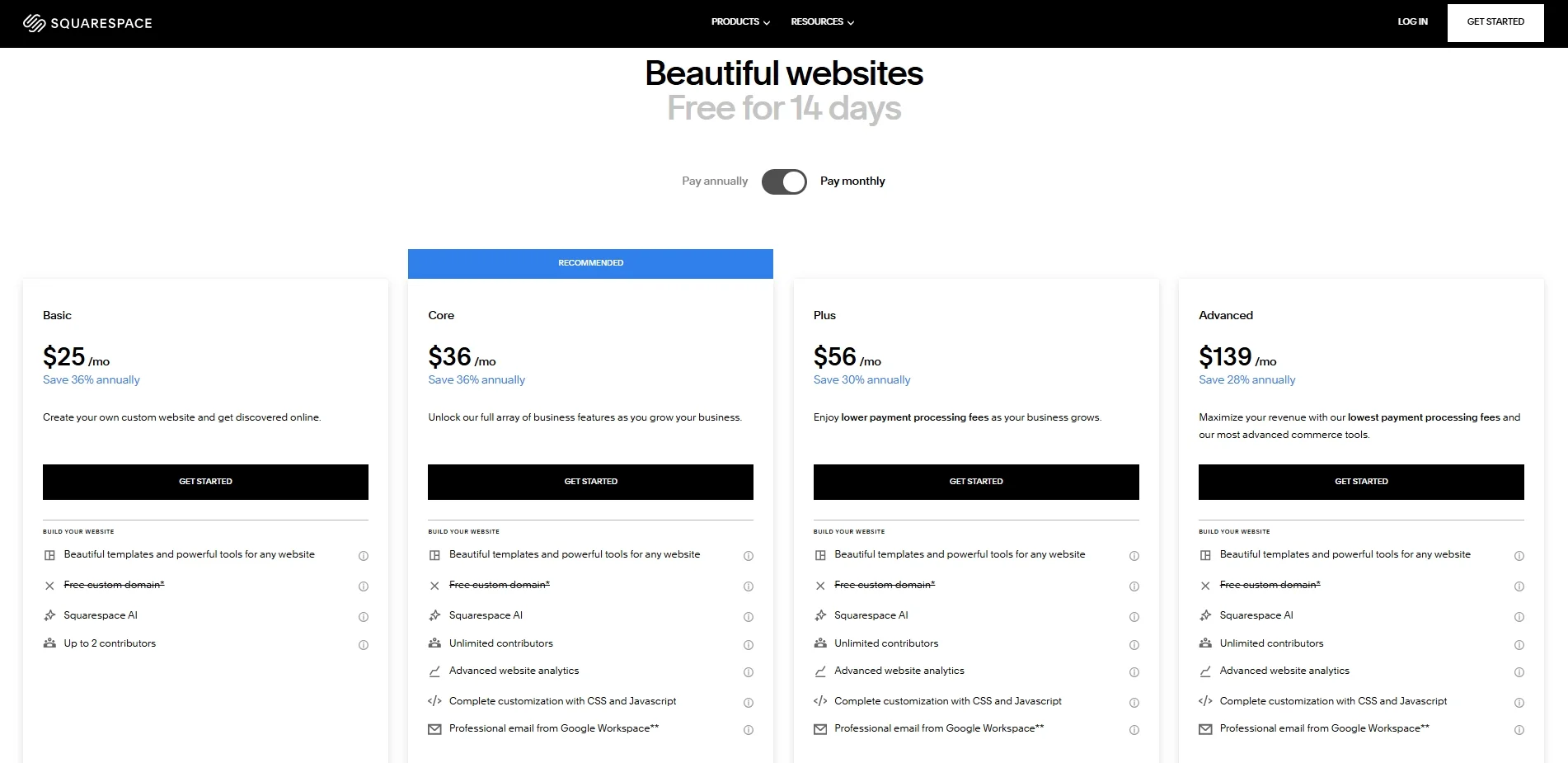
If you’re a handmade seller who wants your brand to stand out visually and you value clean, modern design, Squarespace is one of the best Etsy alternatives for building a professional and cohesive online presence.
#8 WooCommerce
➤ Best for: Experienced sellers or WordPress users who want full control, flexibility, and the ability to deeply customize every part of their store.
WooCommerce is a powerful, open-source ecommerce plugin built for WordPress. It transforms any WordPress site into a fully functional online store, giving you total control over your products, design, and business operations. For handmade sellers who are tech-savvy or already familiar with WordPress, WooCommerce is one of the most flexible and customizable Etsy alternatives available.
Unlike Etsy’s one-size-fits-all format, WooCommerce gives you the freedom to build exactly the store you envision, with full ownership of your content, design, and customer data.
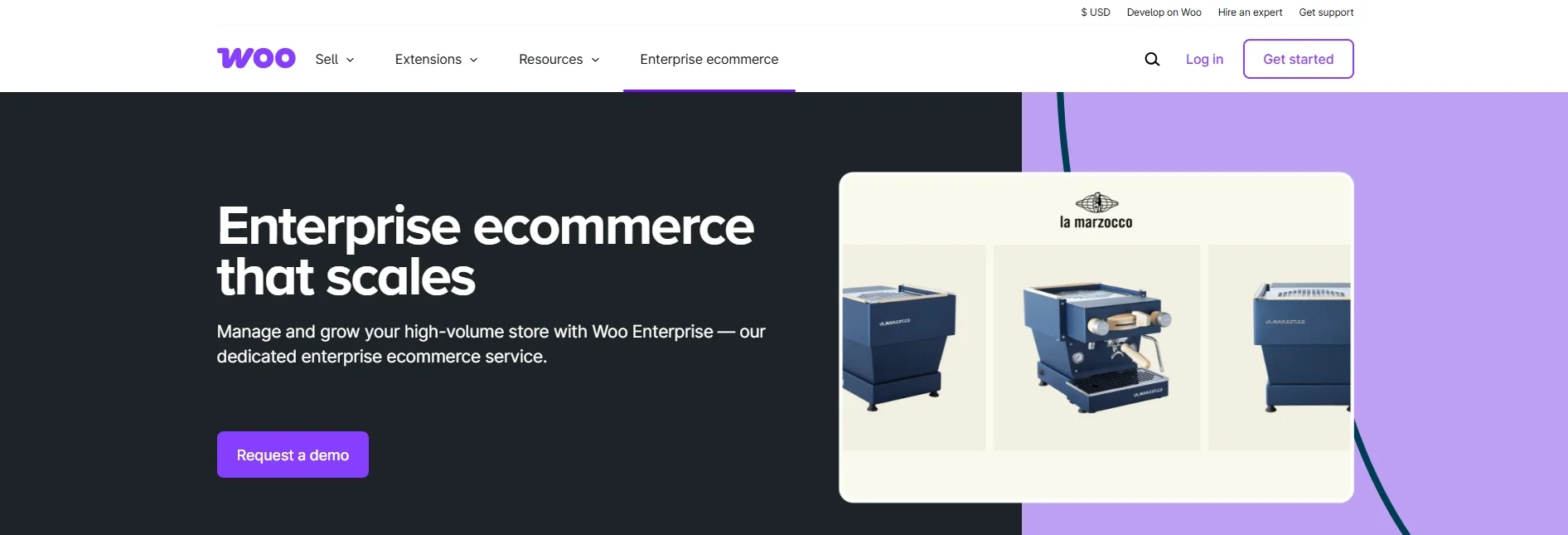
The pros and cons of WooCommerce:
Pros | Cons |
✓ Fully customizable with thousands of themes and plugins ✓ No listing or transaction fees from WooCommerce itself ✓ Complete ownership of your store and customer data ✓ Built on WordPress, ideal for content-driven sellers | ✗ Requires hosting, setup, and maintenance knowledge ✗ Extra costs for premium themes, plugins, and support ✗ Requires ongoing site management and security updates ✗ Can become complex for beginners |
Why WooCommerce is among the best Etsy alternatives:
- No marketplace fees: WooCommerce doesn’t charge listing or transaction fees, unlike Etsy, giving you full profit from each sale.
- Unlimited customization: You control every aspect of your store’s appearance and functionality, from layout to checkout flow.
- Content integration: Since it’s built on WordPress, you can combine ecommerce with blogging, tutorials, or storytelling to build deeper customer relationships.
- Data ownership: You own your store, customer list, and analytics, with no reliance on a third-party platform that can change rules overnight.
WooCommerce pricing: Flexible based on your hosting, themes, and other third-party integrations.
If you’re a DIY-minded seller who wants to build a highly personalized handmade business and scale without platform restrictions, WooCommerce is a top-tier Etsy alternative that offers both power and flexibility. For a full understanding of this platform, please check out our WooCommerce review.
#9 Redbubble
➤ Best for: Graphic designers, illustrators, and digital artists who want to earn passive income through print-on-demand with no inventory or shipping hassles.
Redbubble is a print-on-demand marketplace where independent artists and designers can sell their artwork on a wide range of products, like t-shirts, stickers, wall art, phone cases, and more. It’s not a traditional handmade goods platform, but for digital creators who want to monetize their designs without managing inventory or shipping, Redbubble is a powerful Etsy alternative.
Unlike Etsy, where sellers must produce and ship their own items (or manage a print partner), Redbubble handles the entire fulfillment process, from printing and packaging to customer service, letting you focus solely on creating.
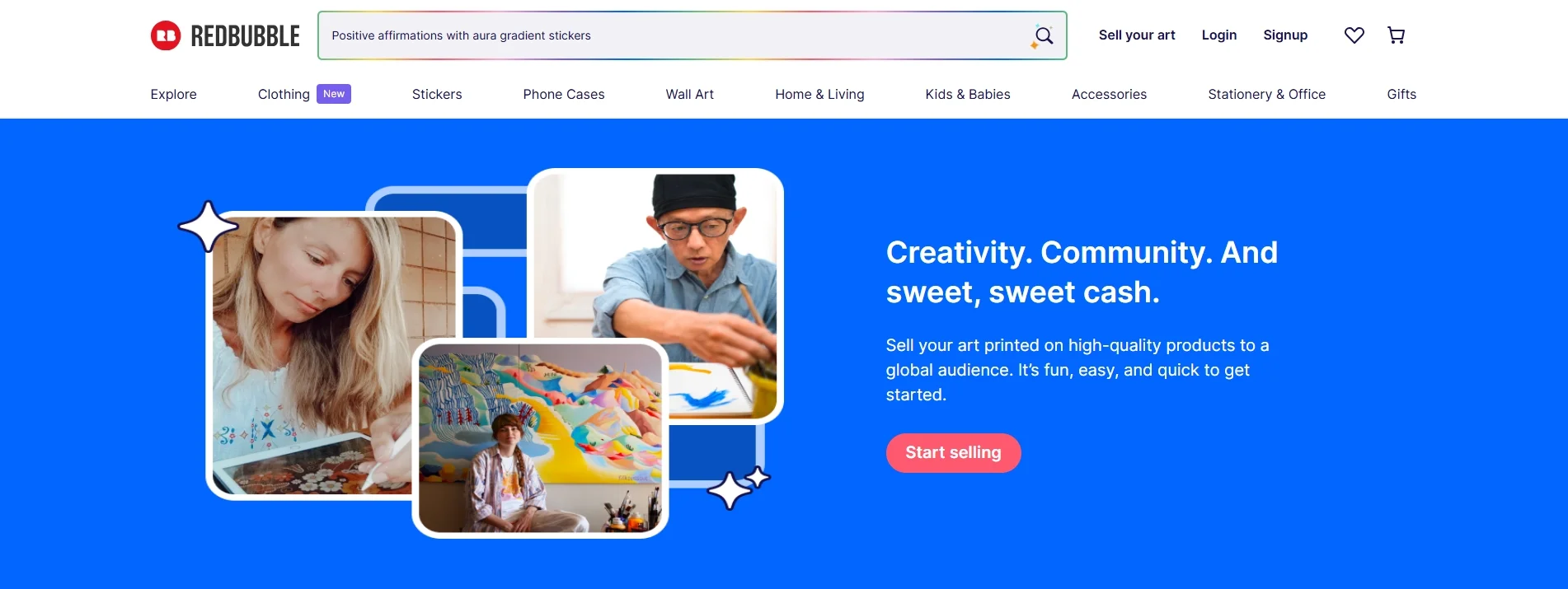
The pros and cons of Redbubble:
Pros | Cons |
✓ No upfront costs or inventory management ✓ Wide range of print-on-demand products available ✓ Completely hands-off fulfillment process ✓ Built-in audience and organic traffic | ✗ Lower profit margins due to Redbubble’s base product pricing ✗ Limited branding and customization options ✗ Less control over product quality and customer experience ✗ Not suitable for physical or one-of-a-kind handmade products |
Why Redbubble is among the best Etsy alternatives:
- Zero fulfillment work: Redbubble handles everything after the sale, including printing, packaging, shipping, and customer service, so you can focus on creating more art.
- No upfront investment: You don’t need to buy materials or hold inventory, making it a low-risk way to start selling your work.
- Product diversity: Sell your designs on dozens of unique items, from home decor to apparel, without managing manufacturing.
- Passive income potential: Once your designs are uploaded, they can continue to generate sales over time with minimal upkeep.
Redbubble pricing: Flexible based on your monthly earnings.
If you’re a digital creator who wants to turn your designs into products without handling the business logistics, Redbubble is an ideal Etsy alternative for hands-off, scalable income.
#10 Bonanza
➤ Best for: Sellers looking to diversify beyond Etsy with low fees, cross-platform listings, and an easy transition process.
Bonanza is a growing online marketplace that blends the best of ecommerce and marketplace functionality. While not exclusively focused on handmade goods, it’s a versatile platform where sellers can list unique, custom, and creative products, much like they would on Etsy. Bonanza’s user-friendly interface, low fees, and easy Etsy import tool make it an attractive alternative for handmade sellers looking to expand or migrate.
Unlike Etsy, Bonanza gives sellers more flexibility in how they manage and market their store, all while offering an easier transition with less competition and a strong emphasis on seller support.
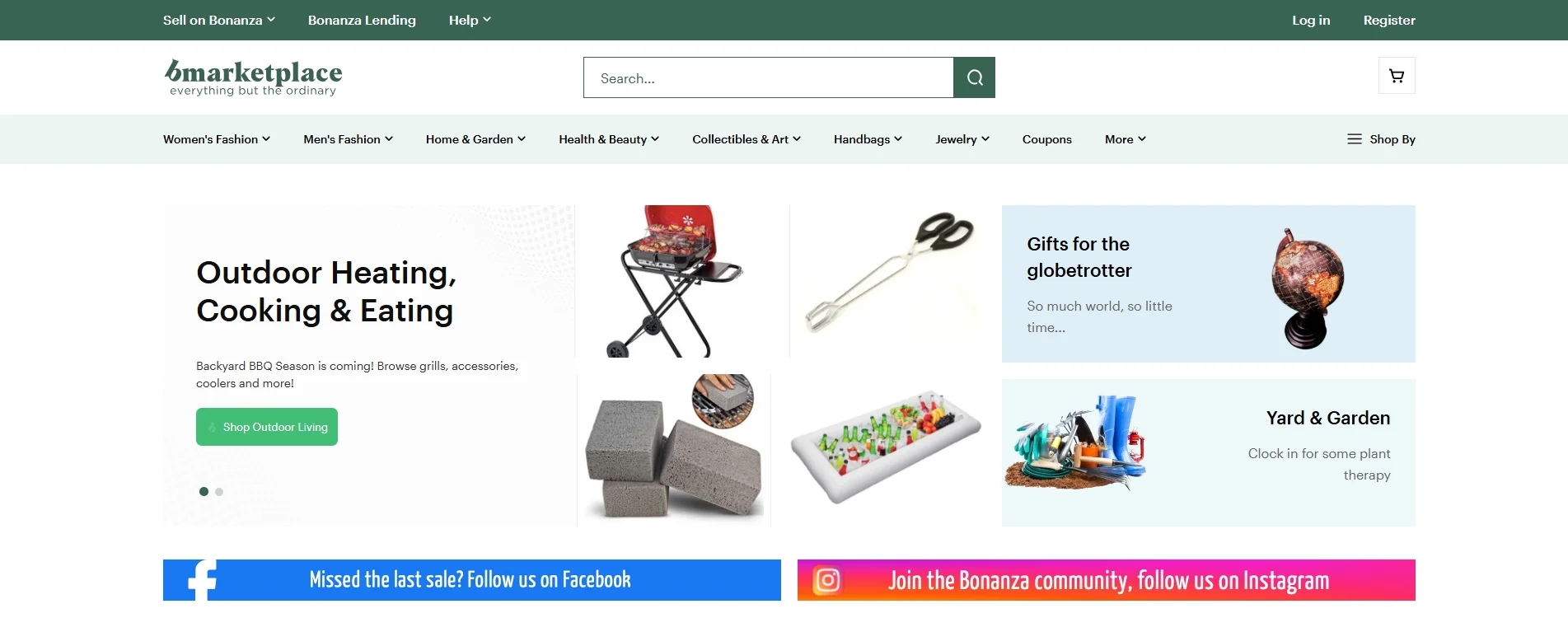
The pros and cons of Bonanza:
Pros | Cons |
✓ Low fees, no listing fees and optional advertising-based commission ✓ Easy import of listings from Etsy, eBay, and Shopify ✓ Built-in tools for Google Shopping and SEO ✓ User-friendly seller dashboard and onboarding process | ✗ Smaller customer base compared to Etsy or Amazon Handmade ✗ Less brand recognition and marketplace traffic ✗ Limited storefront customization options ✗ Not handmade-specific, mixed with general consumer goods |
Why Bonanza is among the best Etsy alternatives:
- Low-cost selling: Bonanza charges no listing fees and only takes a small commission when your item sells, making it more cost-effective than Etsy's per-item and transaction fees.
- Simple Etsy integration: You can quickly import your entire Etsy shop (including images, descriptions, and pricing), making migration hassle-free.
- Supportive seller tools: From customizable shipping rules to flexible pricing and promotion options, Bonanza gives you more control over your store setup.
If you're a handmade seller who wants to branch out beyond Etsy with minimal risk and greater control over your product visibility and costs, Bonanza is a practical and beginner-friendly Etsy alternative worth exploring.
How to Choose the Best Etsy Alternatives
With so many platforms available, choosing the right Etsy alternative depends on your business needs, product type, and long-term goals. There’s no one-size-fits-all solution, so it’s important to consider a few key factors before making your decision.
Here’s what to look at when comparing Etsy alternatives:
- Type of platform: Decide whether you want a marketplace (like Amazon Handmade or Redbubble) that brings traffic to you, or a store builder (like Shopify or Wix) where you build your own audience and brand.
- Fees and costs: Compare listing fees, transaction fees, subscription costs, and payment processing rates. Some platforms charge less than Etsy or offer better value for larger shops.
- Ease of use: Look for a platform that fits your tech comfort level. Beginners may prefer drag-and-drop builders, while experienced users might want full customization with platforms like WooCommerce.
- Design and branding flexibility: If building a unique brand is important to you, choose a platform that offers customizable themes, branding options, and control over the customer experience.
- Audience and reach: Think about where your ideal customers are shopping. A large marketplace may offer instant exposure, while a standalone site gives you more control but requires marketing effort.
- Scalability: If you plan to grow your business, look for features like inventory management, analytics, app integrations, and multi-channel selling.
By weighing these factors, you can choose the Etsy alternative that best supports your goals, fits your workflow, and helps you build a more profitable and sustainable business.
Bonus Reading: Migrate from Etsy to Another Platform
If you've found the best alternative to Etsy, the next big step is moving your store and product data to a new platform. This process can feel overwhelming, especially if you have dozens, or even hundreds, of listings. That’s where LitExtension comes in.
LitExtension is a trusted and widely used shopping cart migration service that helps online sellers transfer their data safely and efficiently. Whether you're switching to Shopify, WooCommerce, BigCommerce, or another Etsy alternative, LitExtension can handle the technical side for you, so you can focus on building your business.
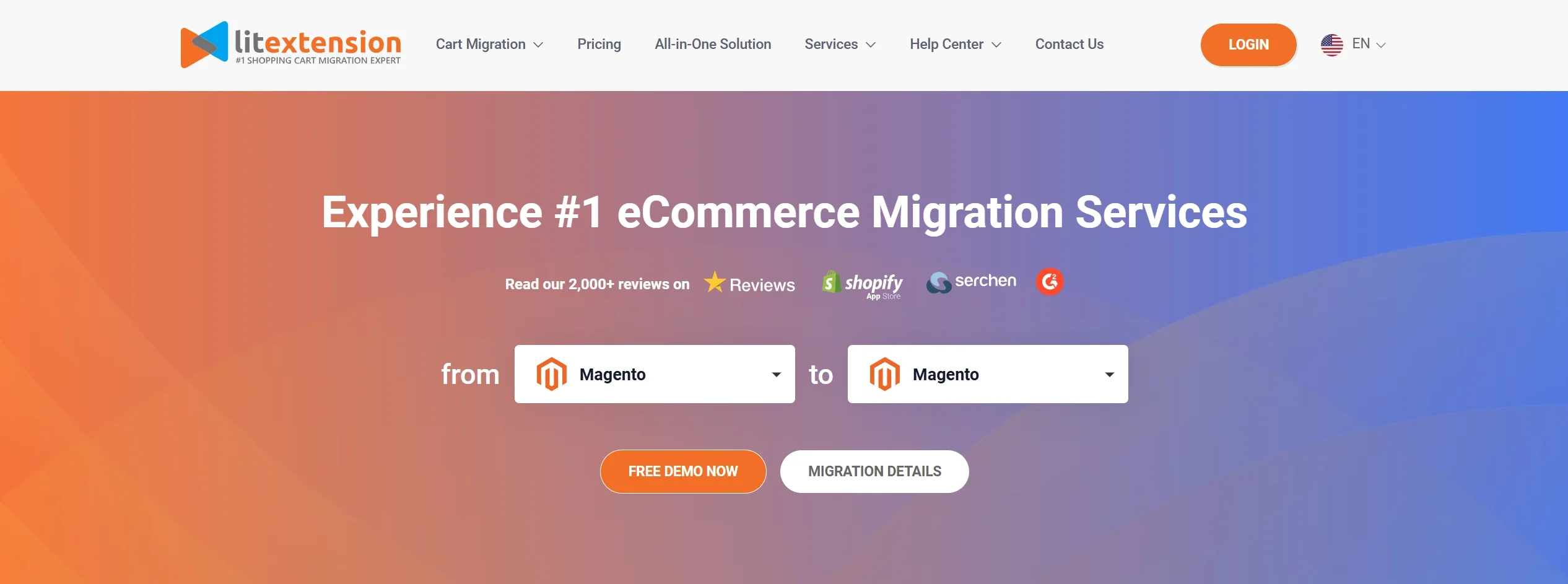
By opting to LitExtension, you'll receive:
- Precise and reliable migration: We guarantee to transfer all your store data, including products, orders, and customers, with a high level of accuracy and security.
- Customer privacy assurance: At LitExtension, we use advanced encryption and top-level security measures to keep all your sensitive data fully protected.
- Personalized migration experience: Every migration is tailored to your needs. LitExtension can handle custom fields, metadata, and unique store requirements.
- Dedicated Personal Asisstant: Once you submit a request, the team provides a detailed migration timeline and roadmap that aligns with your deadlines.
- Clear delivery process: From planning to post-migration support, a personal assistant is available to help with guidance, troubleshooting, and expert advice.
- Keep selling while migrating: LitExtension ensures 100% uptime for your store, meaning no disruption to your sales or customers during the transition.
Not quite ready to leave Etsy behind? You don’t have to. With LitCommerce, a powerful multi-channel selling tool from the creators of LitExtension, you can easily sync your Etsy store with platforms like Shopify, WooCommerce, and BigCommerce.
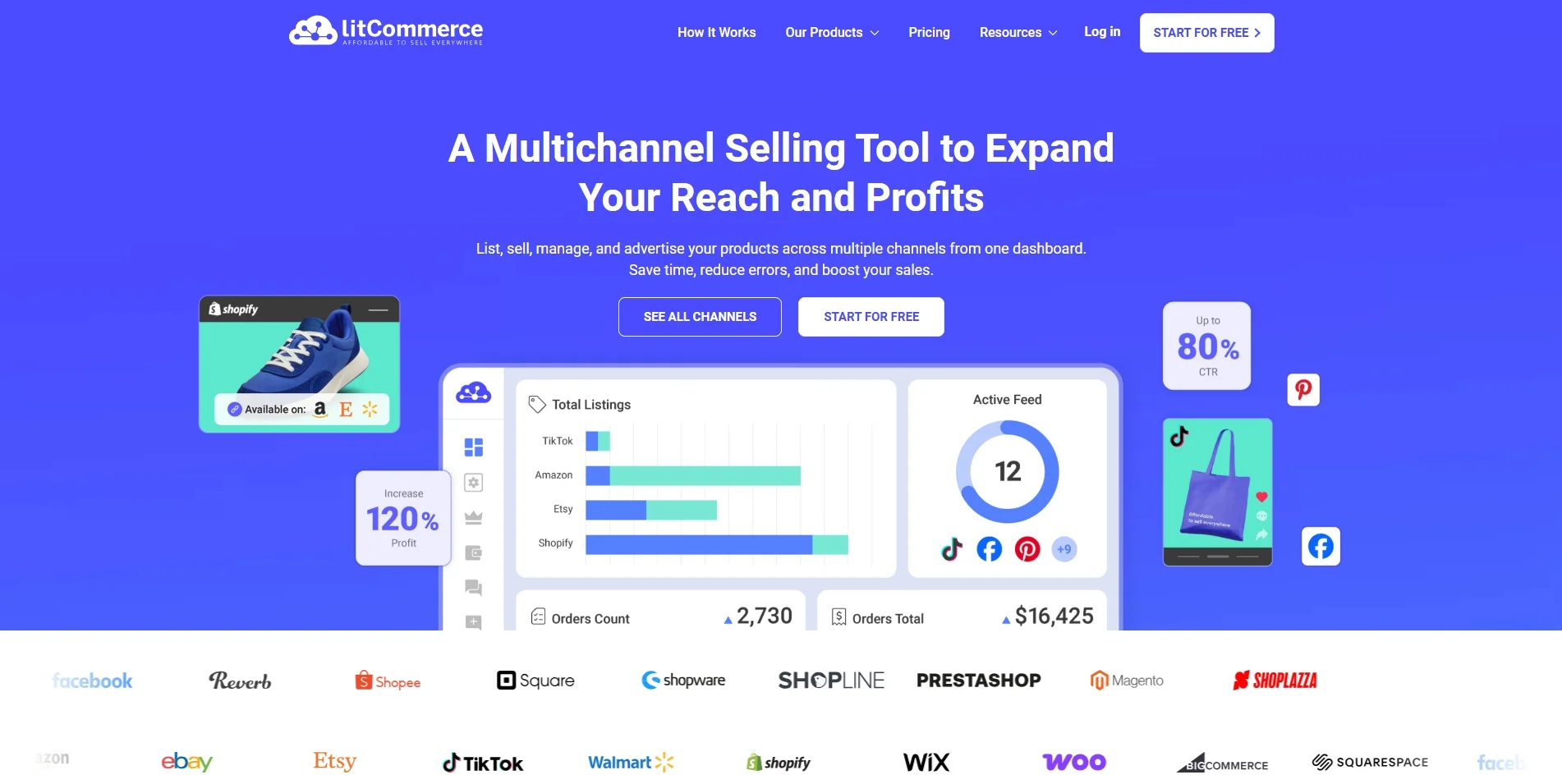
With LitCommerce, you can:
- List products across multiple platforms from a single dashboard
- Sync inventory and order management in real-time
- Expand your reach without doubling your workload
If you want to sell on Etsy and another platform at the same time, LitCommerce makes it simple and scalable.
Etsy Alternatives – FAQs
Is there a better site than Etsy?
That depends on your business goals. If you want more control over branding and fewer fees, platforms like Shopify or BigCommerce might be better options. For sellers who prefer a built-in audience, Amazon Handmade or Redbubble could be more appealing.
Who is Etsy’s biggest competitor?
Amazon Handmade is often considered Etsy’s biggest direct competitor. It caters specifically to handmade goods and benefits from Amazon’s massive customer base and global reach. However, platforms like eBay, Shopify, and Redbubble also attract many of the same types of sellers and buyers.
Is Etsy worth it anymore?
Etsy is still a valuable platform for many creators, especially those just starting out or looking for easy access to a large audience. However, rising fees, increasing competition, and limited shop customization have caused some sellers to look elsewhere. If you're serious about building a brand or want full control over your business, exploring alternatives could be worthwhile.
What is the best platform to sell handmade items?
The “best” platform depends on your needs, but here are some recommendations for you:
1. Amazon Handmade – Ideal for makers who want to reach a massive global audience with the backing of Amazon’s trusted platform.
2. eBay – Great for sellers of vintage, collectible, or one-of-a-kind handmade items who want flexible pricing and auction options.
3. Shopify – Perfect for creators who want full control over branding, store design, and customer experience.
4. BigCommerce – Best suited for growing handmade businesses that need advanced features and multi-channel selling capabilities.
5. Wix – A good choice for artists and crafters who want a beautiful, easy-to-build online store with built-in ecommerce tools.
6. Big Cartel – Designed for independent artists and side hustlers who want a simple, budget-friendly setup with no listing fees.
7. Squarespace – Excellent for visual creatives who want to combine a stunning portfolio with an online shop.
8. WooCommerce – Great for WordPress users who want full flexibility and don’t mind a more hands-on setup process.
9. Redbubble – Ideal for graphic designers and illustrators who want to sell print-on-demand products without managing inventory.
10. Bonanza – A good pick for sellers who want to import their Etsy listings and expand their reach without high fees or steep learning curves.
Each platform has its own strengths, so the best one for you depends on whether you prioritize exposure, creative freedom, ease of use, or cost savings.
Final Words
And that's the end of our list of the best Etsy alternatives. Whether you’re just starting out or looking to scale your existing shop, there’s a platform that can support your goals. From marketplace-style sites like Amazon Handmade and Redbubble to customizable solutions like Shopify and WooCommerce, you have the freedom to choose what works best for you.
Lastly, if you like this article, please don't hesitate to check out other articles on our LitExtension website for more expert tips and insights.
